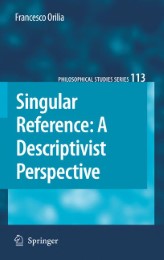Singular Reference: A Descriptivist Perspective (E-Book, PDF)
Singular Reference: A Descriptivist Perspective
eBook - Philosophical Studies Series
Bibliographische Informationen
Format: Digitale Rechteverwaltung: Digitales Wasserzeichen
Beschreibung
Singular reference to ourselves and the ordinary objects surrounding us is a most crucial philosophical topic, for it looms large in any attempt to understand how language and mind connect to the world. This book explains in detail why in the past philosophers such as Frege, Russell and Reichenbach have favoured a descriptivist approach to this matter and why in more recent times Donnellan, Kripke, Kaplan and others have rather favoured a referentialist standpoint. The now dominant referentialist theories however still have a hard time in addressing propositional attitudes and empty singular terms. Here a way out of this difficulty emerges in an approach that incorporates aspects of the old-fashioned descriptivist views of Frege, Russell and Reichenbach without succumbing to the anti-descriptivist arguments that back up the current referentialist trend. The resulting theory features a novel approach to the semantics and pragmatics of determiner phrases, definite descriptions, propernames and indexicals, all treated in uniform fashion in both their anaphoric and non-anaphoric uses.
This work will be of interest to researchers in philosophy of language, philosophy of mind and theoretical linguistics. The wealth of background information and detailed explanations that it provides makes it also accessible to graduate and upper level undergraduates and suitable as a reference book.
Autorenportrait
Francesco Orilia studied philosophy at the university of Palermo (M.A., 1979) and then, after being granted a Fulbright grant, at Indiana University, Bloomington (Ph.D., 1986), where he was a student of Hector-Neri Castañeda, Nino B. Cocchiarella and J. M. Dunn. From 1987 to 1994 he was a researcher in artificial intelligence at the Olivetti research lab in Pisa and from July 1994 to July 1997 a researcher/lecturer in theoretical philosophy at the University of Cagliari. Since August 1997 he has been with the university of Macerata where he is currently professor of philosophy of language. He also had visiting positions at Indiana University, Bloomington (1986), University of Paris IV (2005), University of Iowa at Iowa City (2006), Cambridge University (2008). In the period 2000-2003 he was a member of the selection committee of the E. W. Beth Dissertation Prize for logic, language, and information and he is now in the editorial board ofMetaphysica. He has written or co-edited a few books and published many papers in international journals such asDialectica,Journal of Philosophical Logic,Journal of Symbolic Logic,Notre Dame Journal of Formal Logic,Minds and Machines,Synthese,Topoi.
Inhalt
E-Book Informationen
„eBooks“ sind digitale Bücher. Um eBooks lesen zu können, wird entweder eine spezielle Software für Computer, Tablets und Smartphones oder ein eBook-Reader benötigt. Da es eBooks in unterschieldichen Formaten gibt, gilt es, folgendes zu beachten.
Von uns werden digitale Bücher in drei Formaten ausgeliefert. Die Formate sind EPUB mit DRM (Digital Rights Management), EPUB ohne DRM und PDF. Bei den Formaten PDF und EPUB ohne DRM müssen Sie lediglich prüfen, ob Ihr eBook-Reader kompatibel ist. Wenn ein Format mit DRM genutzt wird, besteht zusätzlich die Notwendigkeit, dass Sie einen kostenlosen Adobe® Digital Editions Account besitzen. Wenn Sie ein eBook, das Adobe® Digital Editions benötigt, herunterladen, erhalten Sie eine ASCM-Datei, die zu Digital Editions hinzugefügt und mit Ihrem Account verknüpft werden muss. Einige eBook-Reader (zum Beispiel PocketBook Touch) unterstützen auch das direkte Eingeben der Login-Daten des Adobe Accounts – somit können diese ASCM-Dateien direkt auf das betreffende Gerät kopiert werden.
Da eBooks nur für eine begrenzte Zeit – in der Regel 6 Monate – herunterladbar sind, sollten Sie stets eine Sicherheitskopie auf einem Dauerspeicher (Festplatte, USB-Stick oder CD) anlegen. Außerdem ist die Anzahl der Downloads auf maximal 5 begrenzt.
Andere Artikel von "Orilia, Francesco"
Lieferbar innerhalb 14 Tagen

Lieferbar innerhalb 14 Tagen

Lieferbar innerhalb 14 Tagen

Weitere Artikel aus der Kategorie "Philosophie/Sonstiges"
Neuerscheinung

Derzeit nicht verfügbar

Lieferbar innerhalb ca. einer Woche

Lieferbar innerhalb ca. einer Woche









